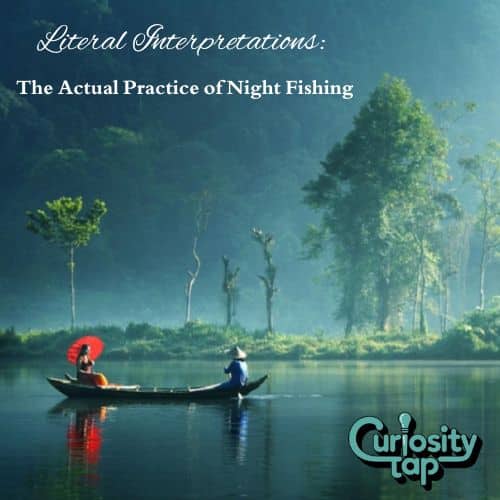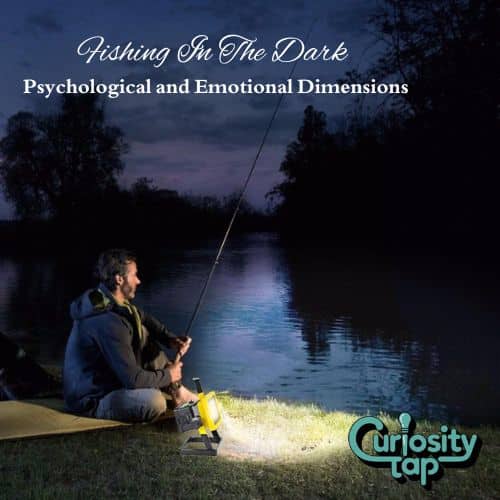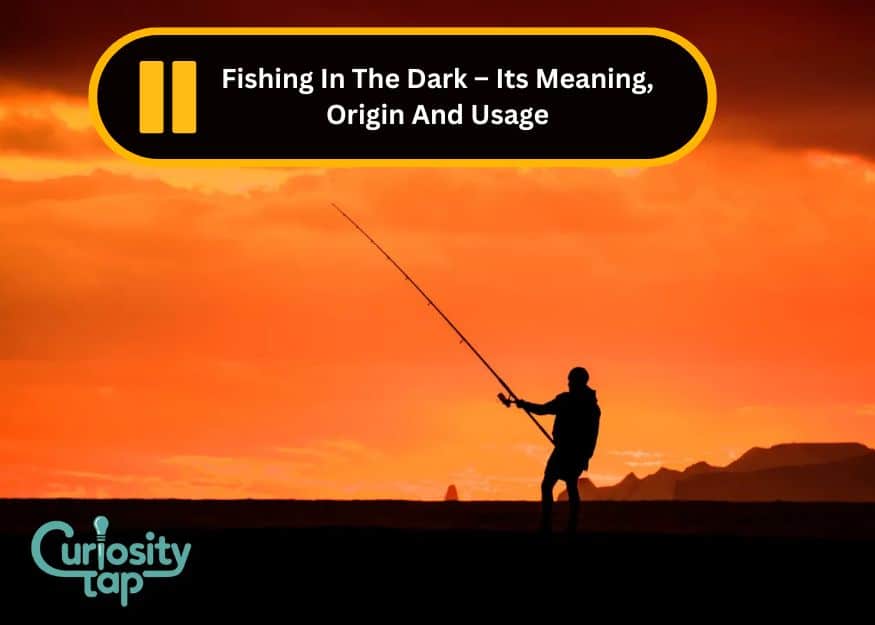Ever heard someone mention “fishing in the dark” and wondered what they actually meant? You’re not alone. This colorful phrase has captured imaginations for decades, weaving through country music, everyday conversations, and literature with surprising versatility. But what does fishing in the dark mean exactly?
The expression carries multiple layers of meaning that shift depending on context. Sometimes it’s romantic and nostalgic. Other times, it describes uncertainty or working without proper information. Let’s dive deep into this fascinating phrase and uncover its rich history, diverse applications, and cultural significance.
Understanding the Core Meaning of “Fishing in the Dark”
The fishing in the dark meaning operates on several levels simultaneously. At its most literal interpretation, it describes the actual practice of fishing during nighttime hours – something many anglers do regularly. However, the phrase has evolved far beyond its literal roots.
Metaphorically speaking, “fishing in the dark” typically means attempting something without adequate knowledge, information, or preparation. When someone says they’re “fishing in the dark,” they’re usually indicating they’re working with incomplete data or making educated guesses rather than informed decisions.
Picture yourself casting a line into murky water where you can’t see what’s beneath the surface – that’s the essence of this metaphor.
Consider this scenario: Sarah walks into a job interview for a position she knows little about. She might tell her friend afterward, “I was completely fishing in the dark during those technical questions.” Here, she’s expressing that she lacked the necessary background knowledge and had to improvise her responses.
The phrase also carries connotations of exploration and discovery. Sometimes fishing in the dark yields unexpected results – you might catch something amazing precisely because you weren’t targeting anything specific. This aspect makes the expression particularly appealing in creative contexts.
The Musical Origins: How a Country Song Sparked Cultural Phenomenon
The Nitty Gritty Dirt Band’s Iconic Hit
The meaning of fishing in the dark gained widespread recognition through the Nitty Gritty Dirt Band’s 1987 hit song “Fishin’ in the Dark.” This track didn’t just climb the country charts – it embedded itself into American cultural consciousness and gave the phrase a distinctly romantic flavor.
Written by Wendy Waldman and Jim Photoglo, the song paints an intimate picture of nighttime romance. The lyrics describe a couple stealing away for a moonlit fishing expedition that’s clearly more about companionship than catching fish.
Lines like “You and me going fishin’ in the dark” transformed the phrase from a simple description of nocturnal angling into something far more suggestive and playful.
The song’s success was remarkable. It reached number one on the Billboard Hot Country Songs chart and became the band’s signature tune. More importantly, it introduced millions of listeners to this particular interpretation of the phrase, where “fishing in the dark” became synonymous with romantic escapades and intimate moments shared under starlit skies.
Cultural Impact Beyond the Charts
The Nitty Gritty Dirt Band’s interpretation influenced how people understood and used the phrase. Suddenly, “fishing in the dark” wasn’t just about uncertainty or literal nighttime fishing – it carried romantic undertones and suggestions of adventure.
Wedding DJs began playing the song at receptions, couples adopted it as “their song,” and the phrase entered common usage as a playful euphemism.
This musical association demonstrates how powerful songs can reshape language. The track gave the expression a warm, nostalgic quality that persists today. When someone mentions “fishin’ in the dark” with that particular spelling and intonation, they’re often referencing the song’s romantic context rather than its metaphorical meaning about uncertainty.
Exploring the Metaphorical Landscape
Operating Without Clear Information
What is the meaning of fishing in the dark when applied to business, relationships, or decision-making? The metaphor perfectly captures those moments when you’re forced to proceed despite incomplete information. It’s the entrepreneurial equivalent of casting a line into unknown waters.
Take Marcus, a marketing director launching a campaign for a new demographic. He might confess to his team, “We’re fishing in the dark here since we don’t have solid data on this age group’s preferences.” The phrase acknowledges both the uncertainty and the necessity of moving forward anyway.
This usage resonates because it combines several relatable elements: the patience required for fishing, the mystery of not knowing what lies beneath the surface, and the hope that your efforts will yield positive results. It’s less harsh than saying “we’re clueless” but more honest than claiming complete confidence.
The Art of Educated Guessing
Sometimes “fishing in the dark” describes situations where you’re making informed guesses based on limited evidence. A detective following a cold case might say she’s “fishing in the dark” when pursuing a new lead. She’s not working randomly – she’s applying experience and intuition to incomplete information.
This application of the phrase carries a sense of professional competence mixed with humility. It acknowledges expertise while admitting limitations. The expression suggests that even without perfect information, skilled individuals can still make progress through careful observation and strategic thinking.

Literal Interpretations: The Actual Practice of Night Fishing
Why Anglers Fish After Dark
Before diving deeper into metaphorical meanings, let’s appreciate the literal practice that inspired the phrase. Fishing in the dark – actual nighttime fishing – represents a time-honored tradition among serious anglers. Many fish species are more active during twilight and nighttime hours, making darkness an optimal time for fishing.
Night fishing offers several advantages. Water temperatures cool down, reducing stress on fish and making them more likely to feed. Fewer boats and people create calmer conditions.
Some species, like catfish and certain bass varieties, are naturally more active after sunset. Additionally, insects emerge in greater numbers during evening hours, providing abundant food sources that attract fish.
Experienced anglers like Robert Thompson, who’s been fishing Kentucky’s lakes for thirty years, explains: “Some of my best catches happened well after dark. Fish that hide during bright daylight become bold when they think predators can’t see them.”
The Equipment and Techniques
Night fishing requires specialized equipment and techniques. Anglers use illuminated bobbers, glow-in-the-dark lures, and headlamps to navigate safely. They often rely more heavily on sound and feel rather than sight, developing heightened sensitivity to subtle line movements and underwater activity.
This reliance on senses other than sight adds another layer to the metaphorical meaning. When you’re literally fishing in the dark, you must trust your instincts and pay attention to subtle cues – skills that translate well to navigating uncertain situations in other areas of life.
Literary and Media References
Books and Publications
The phrase “fishing in the dark” has appeared in numerous book titles and literary works. Authors gravitate toward the expression because it evokes mystery, romance, and uncertainty simultaneously. Romance novels particularly favor this imagery, using it to describe relationships developing despite unclear circumstances.
Mystery writers also embrace the phrase. A detective novel might be titled “Fishing in the Dark” to suggest both the investigative process and the obscured nature of the crimes being solved. The metaphor works beautifully for genres that deal with uncovering hidden truths.
Television and Film
Screen writers have discovered the phrase’s versatility. It appears in dialogue when characters discuss uncertain situations or romantic encounters. The expression’s musical associations make it particularly effective in scenes requiring emotional resonance or nostalgic atmosphere.
Documentary filmmakers have used “fishing in the dark” to describe research processes, especially when investigating historical events with limited documentation. The phrase captures the challenge of reconstructing past events from fragmentary evidence.
Alternative Expressions and Synonyms
Common Alternatives to “Fishing in the Dark”
While “fishing in the dark” has its unique charm, several other expressions convey similar meanings. Understanding these alternatives helps clarify when and why someone might choose this particular phrase over others.
“Shot in the dark” is perhaps the closest equivalent, but it carries more implications of randomness and luck. When someone takes a “shot in the dark,” they’re often making a wild guess with little expectation of success. “Fishing in the dark” suggests more patience and methodology.
“Flying blind” emphasizes the lack of guidance or information, but it focuses more on navigation than discovery. Pilots flying blind must rely on instruments, while people fishing in the dark might still catch something valuable through patience and skill.
“Groping in the dark” shares the uncertainty element but lacks the optimistic undertones. It suggests frustration and desperation rather than the hopeful exploration implied by fishing.
Why “Fishing in the Dark” Stands Out
The enduring appeal of this particular phrase lies in its positive connotations. Unlike expressions that emphasize confusion or helplessness, “fishing in the dark” maintains an element of hope and possibility. It suggests that even without complete information, good things might happen through patience and persistence.
The phrase also benefits from its musical associations. The Nitty Gritty Dirt Band’s song gave it emotional weight and cultural recognition that purely metaphorical expressions often lack. When someone says they’re “fishing in the dark,” listeners often connect it with feelings of romance, adventure, and optimism.
Modern Usage and Contemporary Applications
Digital Age Interpretations
In today’s information-saturated world, the fishin in the dark meaning has evolved to address new situations. Social media marketers might describe launching campaigns without clear analytics as “fishing in the dark.” Software developers working with emerging technologies often use the phrase when discussing experimental features.
The expression has found particular relevance in data science and artificial intelligence. Researchers training machine learning models with limited datasets might describe their work as “fishing in the dark” – they’re seeking patterns and insights without knowing exactly what they’ll discover.
Professional and Business Contexts
Modern professionals have embraced the phrase for its diplomatic qualities. It allows someone to acknowledge uncertainty without appearing incompetent. A consultant might tell clients, “We’re fishing in the dark until we get more market research,” which sounds more professional than “We have no idea what we’re doing.”
The phrase also works well in team settings. It encourages collaboration by acknowledging shared uncertainty rather than individual ignorance. Team members can work together to “fish in the dark” rather than feeling isolated in their confusion.
Regional and Cultural Variations
Country Music’s Lasting Influence
The phrase maintains strong associations with country music culture and rural communities. In these contexts, “fishing in the dark” often retains its romantic connotations while also connecting to actual outdoor experiences. People who grew up around fishing and hunting naturally understand both literal and metaphorical applications.
Southern and Midwestern regions of the United States show particularly strong connections to the phrase. The combination of fishing culture and country music popularity makes “fishing in the dark” a familiar and comfortable expression in these areas.
International Perspectives
While the phrase originated in American English, it has spread to other English-speaking countries with interesting variations. British speakers might say “fishing in the dark” but are more likely to use “fumbling in the dark” or “working in the dark.” Australian English has adopted the phrase, though it competes with local expressions like “trying to catch a wombat in the dark.”

Psychological and Emotional Dimensions
The Psychology of Uncertainty
The phrase “fishing in the dark” resonates psychologically because it addresses universal human experiences. Everyone faces situations where they must act without complete information. The expression provides a framework for discussing these challenging moments without focusing on fear or inadequacy.
Psychologically speaking, the fishing metaphor emphasizes patience and hope rather than anxiety and frustration. It suggests that uncertainty can be productive – that the act of “fishing” itself might yield unexpected discoveries. This reframing helps people approach uncertain situations with more confidence and creativity.
Emotional Comfort in Familiar Metaphors
The popularity of “fishing in the dark” partly stems from its emotional accessibility. Most people can relate to fishing, even if they’ve never done it seriously. The activity represents patience, quiet reflection, and connection with nature – all comforting concepts when facing uncertainty.
The “dark” element adds mystery without overwhelming fear. It’s the darkness of evening rather than the darkness of danger. This balance makes the phrase emotionally safe while still acknowledging real challenges.
Conclusion
The phrase “fishing in the dark” has achieved remarkable staying power because it captures something essential about human experience. Whether describing literal nighttime fishing, romantic adventures, or professional uncertainties, the expression provides a gentle way to acknowledge limitations while maintaining hope for positive outcomes.
From its musical origins in 1987 to its modern applications in business and technology, “fishing in the dark” continues evolving while retaining its core appeal. It reminds us that uncertainty doesn’t have to be paralyzing – sometimes the best discoveries happen when we’re patient enough to cast our lines into unknown waters.
The next time you hear someone mention “fishing in the dark,” you’ll understand they’re not just talking about nighttime angling.
They’re describing one of humanity’s most common experiences: moving forward despite incomplete information, hoping that patience and persistence will eventually yield something valuable. In a world that often demands certainty, this humble phrase offers permission to embrace uncertainty with grace and optimism.
Frequently Asked Questions
What does “fishing in the dark” actually mean?
“Fishing in the dark” has two main meanings. Literally, it’s nighttime fishing when many fish are most active. Metaphorically, it means working without complete information or making educated guesses in uncertain situations. The phrase became popular through the Nitty Gritty Dirt Band’s 1987 hit song, which gave it romantic undertones.
Why did the song “Fishin’ in the Dark” become so popular?
The Nitty Gritty Dirt Band’s “Fishin’ in the Dark” hit #1 on country charts because it perfectly captured romantic escapism. The song wasn’t really about fishing – it used nighttime fishing as a playful metaphor for intimate moments and adventure. Its catchy melody and suggestive lyrics made it a wedding favorite and cultural phenomenon.
When should I use “fishing in the dark” in conversation?
Use this phrase when you’re tackling something with limited information but staying optimistic. It’s perfect for business situations (“We’re fishing in the dark until the market research comes in”), creative projects, or any time you’re exploring unknown territory. It sounds more positive than “flying blind” or “shooting in the dark.”
Read more knowledgeable blogs on Curiosity Tap
Is this article helpful?

Jackson Pearson is a passionate educator and language enthusiast behind the blog Jackson Pearson. With years of experience in teaching and writing, he specializes in simplifying complex grammar rules, breaking down tricky vocabulary, and crafting learning guides that are both engaging and practical. His mission is to help readers boost their English skills whether they’re beginners or brushing up for fluency. Through every article, Jackson brings clarity, structure, and a spark of curiosity to the world of English learning.

